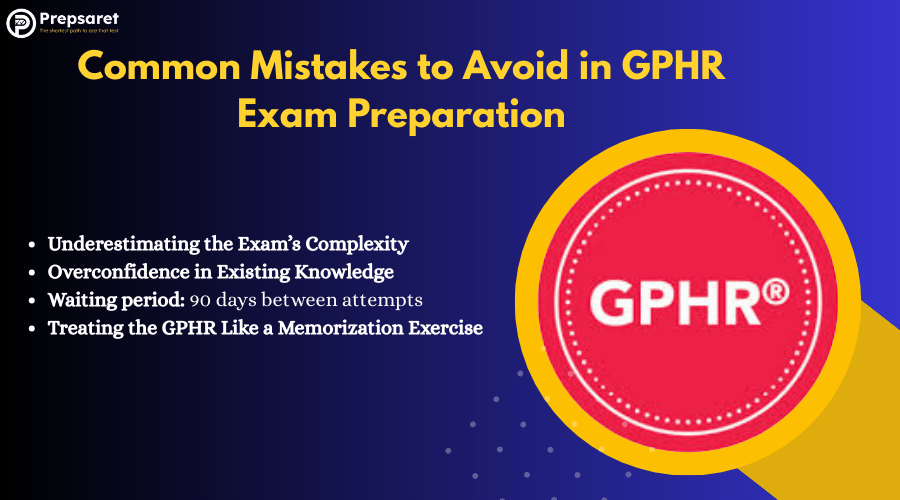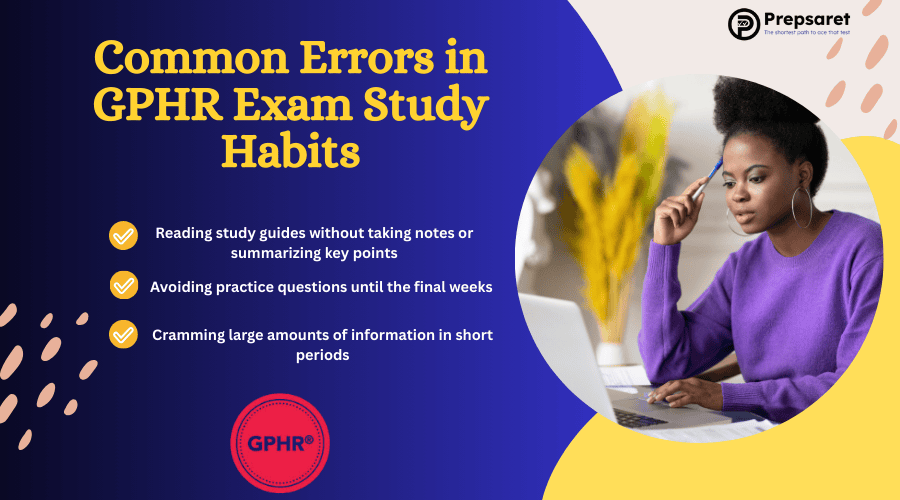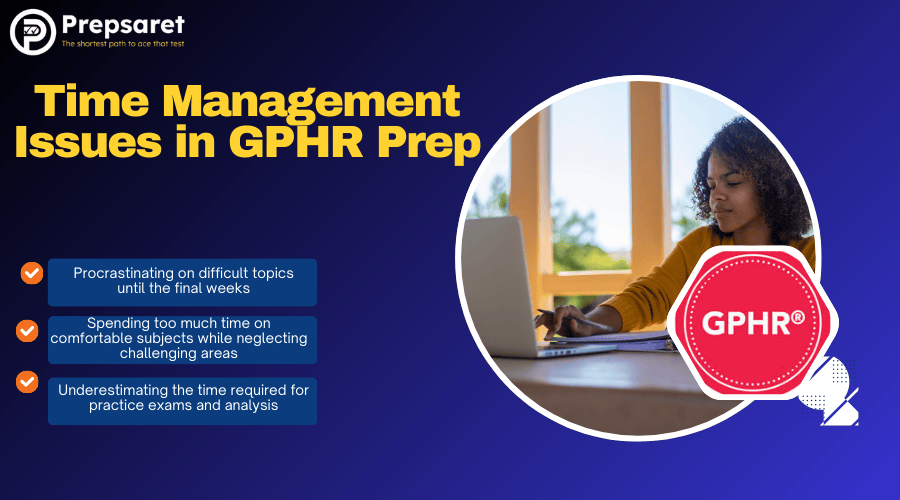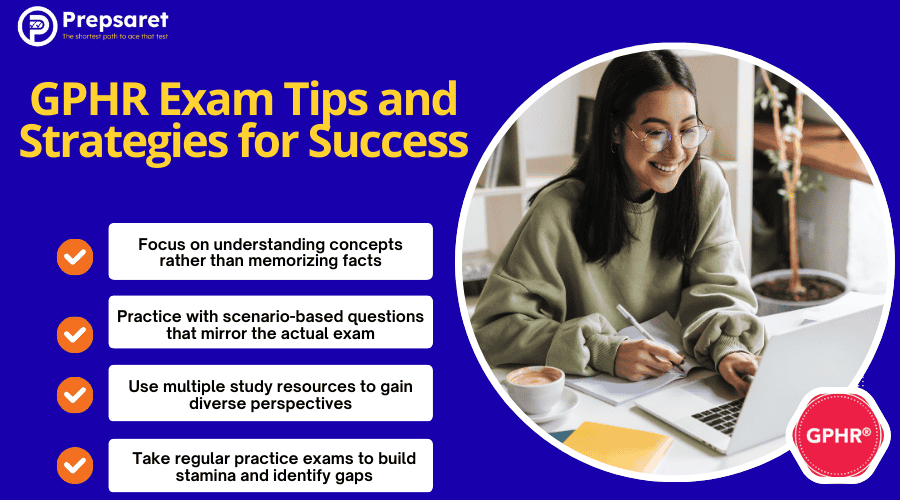The journey to becoming a Global Professional in Human Resources (GPHR) certified professional, is challenging, but understanding the common mistakes to avoid when preparing for the GPHR exam, can significantly boost your chances of success.
Many HR professionals stumble not because they lack knowledge, but because they fall into predictable preparation traps. By recognizing these pitfalls early, you can develop a strategic approach that maximizes your study time and increases your likelihood of passing.
This comprehensive guide by Prepsaret will walk you through the most frequent mistakes candidates make and provide actionable best practices to help you achieve GPHR certification with confidence.
High Stakes of the GPHR Exam
The GPHR certification represents the pinnacle of global HR expertise, and the Global Professional in Human Resources exam pitfalls can be career-defining.
Failing this prestigious exam doesn’t just mean retaking it, it impacts your professional momentum, delays career advancement, and can cost thousands of dollars in preparation materials, exam fees, and lost opportunities.
Why the GPHR Exam is Different
Understanding how to avoid failing the GPHR exam begins with recognizing that this isn’t just another certification test. The GPHR exam demands:
- Mastery of complex international HR concepts
- Deep cultural awareness and global compliance knowledge
- Strategic thinking and application of HR best practices
The financial investment alone, including study materials, training programs, and exam fees, can exceed $3,000. More importantly, the time investment often spans 6–12 months of intensive preparation.
The Real Cost of Failing the GPHR Exam
When you fail the GPHR exam, you’re not just back to square one, you’re facing:
- Diminished confidence in your abilities
- Extended career advancement timelines
- Additional financial burden for retaking the exam
- Potential negative impact on current job opportunities
Related: GPHR Certification Cost
Most Frequent GPHR Exam Preparation Mistakes
GPHR exam preparation mistakes follow predictable patterns that consistently derail otherwise capable candidates. After analyzing thousands of exam attempts, several critical errors emerge repeatedly.
Mistakes HR Professionals Make in GPHR Exam Prep
- Underestimating the Exam’s Complexity: Many experienced HR professionals assume their domestic expertise automatically translates to global competency. This assumption leads to superficial preparation that doesn’t address the nuanced differences between regional HR practices.
- Overconfidence in Existing Knowledge: Mistakes HR professionals make in GPHR exam attempts often stem from believing they already know enough. This overconfidence causes candidates to skip foundational topics — a risky move since the GPHR tests both basic and advanced concepts in a global context.
- Treating the GPHR Like a Memorization Exercise: Unlike domestic HR certifications, the GPHR requires deep analytical thinking and the ability to apply principles across diverse cultural and legal frameworks. Candidates who rely solely on rote learning struggle with scenario-based questions that form the exam’s backbone.
Key GPHR Preparation Mistakes to Avoid
- Rushing through study materials without deep comprehension
- Ignoring cultural context in HR practices
- Focusing only on familiar regions or industries
- Underestimating the time required for thorough preparation
- Failing to integrate theoretical knowledge with practical applications
Common Errors in GPHR Exam Study Habits
Common errors in GPHR exam study create significant barriers to success, even for highly motivated candidates. These mistakes often stem from passive learning methods, poor planning, and the absence of consistent progress tracking.
Ineffective GPHR Study Habits
The most destructive study mistake is passive reading without active engagement. Many candidates spend hours reviewing materials but fail to test their understanding or apply concepts to real scenarios.
Examples of ineffective study habits:
- Reading study guides without taking notes or summarizing key points
- Avoiding practice questions until the final weeks
- Studying in isolation without peer discussion or expert guidance
- Cramming large amounts of information in short periods
- Neglecting to review and reinforce previously covered material
Successful candidates replace these habits with active learning techniques, such as:
- Creating mind maps
- Participating in study groups
- Teaching concepts to others
- Regularly testing knowledge through practice questions from platforms like Prepsaret.
Poor Planning and Lack of Structure
Poor planning represents another critical study habit error. Many candidates begin preparation without establishing clear milestones, deadlines, or progress tracking mechanisms. This leads to:
- Last-minute cramming sessions
- Incomplete coverage of essential topics
- Reduced retention of complex information
Strong GPHR study habits include:
- Daily study sessions with specific objectives
- Weekly progress assessments and adjustments
- Regular practice testing to identify knowledge gaps
- Consistent review of challenging concepts
- Integration of multiple study resources and methods
Try Out: Free GPHR Practice Questions
GPHR Study Plan Mistakes to Avoid
GPHR study plan mistakes to avoid can derail even the most motivated candidates. The foundation of successful GPHR preparation lies in creating a comprehensive, realistic study plan that accounts for the exam’s breadth and complexity.
One of the most significant GPHR certification exam preparation errors is setting unrealistic timelines.
Many candidates underestimate the time required to master global HR concepts, attempting to compress 6-12 months of recommended study time into 2-3 months. This approach leads to superficial understanding and poor exam performance.
Common Study Plan Mistakes
- Allocating equal time to all topics regardless of complexity or personal familiarity
- Ignoring weak areas while overemphasizing strengths
- Failing to include sufficient time for practice exams and review
- Not building buffer time for unexpected challenges or concept reinforcement
- Creating plans that don’t align with personal learning styles or schedules
The 70–20–10 Study Rule
Effective study plans should follow this proven structure:
- 70% content learning,
- 20% practice testing, and
- 10% final review.
This distribution ensures comprehensive understanding while providing adequate practice with exam-style questions.
Elements of a Strong GPHR Study Plan
Your study plan should include:
- Detailed timeline with weekly and monthly milestones
- Specific time allocations for each GPHR domain
- Regular assessment points to evaluate progress
- Flexibility to adjust based on learning needs
- Integration of various study methods and resources
- Scheduled breaks to prevent burnout and maintain motivation
Prepsaret offers structured study plans with realistic timelines that have helped thousands of candidates successfully navigate their GPHR preparation journey.
Continue reading: HR Certification Classes
Time Management Issues in GPHR Prep
Effective time management is crucial for GPHR success, and understanding GPHR exam time management tips can make the difference between passing and failing.
Many candidates struggle with balancing comprehensive preparation with demanding professional and personal responsibilities.
Avoid These Mistakes in GPHR Test Prep
Avoid these mistakes in GPHR test prep related to time management:
- Procrastinating on difficult topics until the final weeks
- Spending too much time on comfortable subjects while neglecting challenging areas
- Failing to establish consistent daily study routines
- Underestimating the time required for practice exams and analysis
- Not tracking time spent on different topics or activities
The most successful candidates treat GPHR preparation like a part-time job, dedicating 15-20 hours per week over 6-8 months. This approach allows for deep learning, regular practice, and adequate review time without overwhelming your existing commitments.
Effective Time Management Strategies
- Creating daily study schedules with specific time blocks
- Using productivity techniques like the Pomodoro Technique
- Prioritizing high-impact activities like practice testing
- Setting boundaries to protect study time from interruptions
- Regularly evaluating and adjusting time allocation based on progress
During the actual exam, time management becomes even more critical. The GPHR exam consists of 140 questions to be completed in 3 hours, requiring approximately 90 seconds per question. Practice with timed exams helps develop the pacing skills necessary for success.
Find out: How long does it take to prepare for the GPHR exam?
GPHR Exam Tips and Strategies for Success
Mastering GPHR exam tips and strategies requires understanding both content mastery and test-taking techniques. The GPHR exam demands more than knowledge, it requires strategic thinking and cultural sensitivity applied to complex HR scenarios.
GPHR Exam Prep Do’s and Dont’s
Essential Do’s for GPHR Exam Prep:
- Focus on understanding concepts rather than memorizing facts
- Practice with scenario-based questions that mirror the actual exam
- Develop cultural competency across different global regions
- Use multiple study resources to gain diverse perspectives
- Take regular practice exams to build stamina and identify gaps
- Join study groups or forums for peer learning and support
Critical Don’ts for GPHR Preparation:
- Rely solely on one study guide or resource
- Ignore practice questions until the final preparation phase
- Study in marathon sessions without breaks or review
- Focus exclusively on domestic HR practices
- Underestimate the importance of global cultural awareness
- Attempt the exam without taking multiple full-length practice tests
Winning GPHR Exam Strategy
Balance content review with frequent, realistic practice testing. A proven approach follows three phases:
- Foundation Phase (40% of study time): Deep understanding of all content domains
- Application Phase (40%): Practice applying knowledge to real-world, scenario-based questions
- Mastery Phase (20%): Take full practice exams, then review and strengthen weak areas
The most effective strategy involves balancing content review with extensive practice testing. Prepsaret provides the most comprehensive collection of GPHR practice questions that mirror the actual exam format and difficulty level.
Building Your GPHR Exam Readiness Checklist
Creating a comprehensive GPHR exam readiness checklist ensures nothing falls through the cracks during your preparation journey. This checklist should cover content mastery, practical preparation, and exam day logistics.
Content Mastery
- Completed review of all six GPHR content areas
- Achieved minimum 85% accuracy on practice questions for each domain
- Demonstrated understanding of cultural differences in HR practices
- Successfully completed at least 5 full-length practice exams
- Identified and addressed all knowledge gaps through targeted study
Study Resources
- Use a primary study guide (e.g. HRCI or other reputable publisher)
- Access a comprehensive practice question bank offered by Prepsaret
- Supplement with specialized materials for weaker domains
- Seek expert guidance or mentorship when needed
- Join study group or peer support network for accountability and support
Practical Preparation
- Maintain a consistent study schedule throughout your prep timeline
- Track progress with a clear monitoring system
- Show steady improvement in practice exam scores
- Strengthen time management skills with timed practice sets
- Practice stress management and focus techniques
Exam Day Logistics
- Schedule and confirm your exam appointment well in advance
- Verify the testing center location and plan your travel route
- Prepare all required identification documents
- Submit any accommodation requests early
- Pack personal comfort items and plan your exam-day routine
Learn more: GPHR Exam Format & Structure
Best Practices for GPHR Exam Preparation
Understanding GPHR exam preparation best practices can significantly improve your chances of first-attempt success. These practices have been refined through analysis of thousands of successful GPHR candidates.
The foundation of effective preparation is using a reliable study guide for passing the GPHR exam. While several options exist, the most successful candidates combine multiple resources to ensure comprehensive coverage.
Prepsaret stands out by offering the most accurate and up-to-date practice questions that closely mirror the actual exam experience.
- Comprehensive Content Coverage: Strong preparation begins with methodically studying all six GPHR domains, giving equal attention to each while understanding the interconnections between HR functions. Successful candidates also recognize the importance of cultural and legal variations across regions and practice applying theoretical knowledge to real-world HR scenarios. This approach ensures that learning is both comprehensive and practical.
- Active Learning Techniques: Retention improves when learning is interactive. Creating detailed study notes, mapping out complex concepts, and explaining them to colleagues or peers helps reinforce understanding. Participation in professional forums or discussion groups adds perspective, while mentorship from current GPHR holders can provide insider tips and guidance to refine exam strategy.
- Regular Assessment and Adjustment: Tracking progress is a non-negotiable part of effective preparation. Taking practice exams every two to three weeks allows candidates to measure improvement and quickly identify weak areas. Reviewing incorrect answers in detail and adjusting study plans accordingly ensures that preparation remains targeted. Maintaining a study log also promotes discipline and consistency throughout the process.
- Strategic Practice Testing: The best results come from practice tests that replicate the actual exam environment. Using diverse question sources prevents over-familiarity, while focusing on scenario-based questions builds the analytical skills required for the GPHR. Practicing under timed conditions strengthens pacing, and reviewing the rationale behind both correct and incorrect answers enhances comprehension and retention.
The most successful candidates treat GPHR preparation as professional growth, not just exam readiness.
This mindset encourages deeper engagement with the material, fosters long-term retention, and strengthens global HR competencies that will remain valuable well beyond test day.
Continue reading: Best GPHR Study Materials & Exam Prep Resources 2025
How to Avoid Failing the GPHR Exam
Understanding how to avoid failing the GPHR exam requires synthesizing all preparation elements into a cohesive strategy. The difference between success and failure often comes down to execution of fundamentals rather than discovering secret techniques.
Critical Success Factors:
Mindset and Approach
- Treat preparation as a professional development investment rather than just an exam requirement.
- Maintain consistent effort over an extended timeline (ideally 6–8 months).
- Embrace a global HR perspective instead of relying solely on domestic HR knowledge.
- Build confidence through thorough preparation, not last-minute cramming.
Resource Optimization
- Invest in high-quality study materials and realistic practice questions.
- Use Prepsaret’s extensive question bank for accurate, exam-like practice.
- Seek guidance from GPHR-certified professionals for targeted advice.
- Join study groups for accountability, shared resources, and peer learning.
Strategic Execution
- Follow a structured study plan with clear milestones.
- Balance content learning with extensive practice testing.
- Address weak areas immediately rather than avoiding them.
- Maintain detailed progress tracking and adjust your plan as needed.
Final Preparation
- Complete multiple full-length practice exams under timed conditions.
- Aim for consistent scores above the passing threshold before test day.
- Review and reinforce challenging concepts identified through practice.
- Develop and rehearse an exam day routine and stress management techniques.
Note: Remember that GPHR preparation is a marathon, not a sprint. Candidates who maintain steady progress over 6-8 months consistently outperform those who attempt intensive last-minute preparation.
Common Mistakes to Avoid When Preparing for the GPHR Exam: FAQs
How Can I Avoid Poor Time Management During GPHR Exam Prep?
Effective time management requires creating realistic study schedules, dedicating consistent daily study time, prioritizing high-impact activities like practice testing, and regularly tracking progress.
Most successful candidates treat preparation like a part-time job, dedicating 15-20 hours weekly over 6-8 months.
What Study Habits Lead to Failure in the GPHR Exam?
Ineffective study habits include passive reading without active engagement, avoiding practice questions, cramming information without understanding, studying in isolation, and failing to address identified weak areas. Success requires active learning techniques, regular practice testing, and comprehensive review of all content domains.
Are Practice Tests Necessary for GPHR Exam Success?
Practice tests are absolutely essential for GPHR success. They help identify knowledge gaps, build exam stamina, develop time management skills, and familiarize candidates with question formats.
Platforms like Prepsaret provide the most comprehensive and accurate practice questions available.
How Do I Create an Effective GPHR Exam Study Plan?
An effective study plan should span 6-8 months, allocate time proportionally across all content domains, include regular practice testing, incorporate multiple learning methods, and build in flexibility for adjustments.
The plan should follow the 70-20-10 rule: 70% content learning, 20% practice testing, and 10% final review.
Common Mistakes to Avoid When Preparing for the GPHR Exam: Conclusion
Successfully navigating the GPHR exam requires more than just knowledge—it demands strategic preparation that avoids common pitfalls.
By understanding these common mistakes to avoid when preparing for the GPHR exam, you’re already ahead of many candidates who stumble into predictable traps.
Remember that thorough preparation using quality resources like Prepsaret, consistent effort over adequate time, and strategic practice testing form the foundation of success. The investment you make in proper GPHR preparation will pay dividends throughout your global HR career.
Stay focused, remain consistent, and approach your preparation with the same professionalism you bring to your HR practice.




